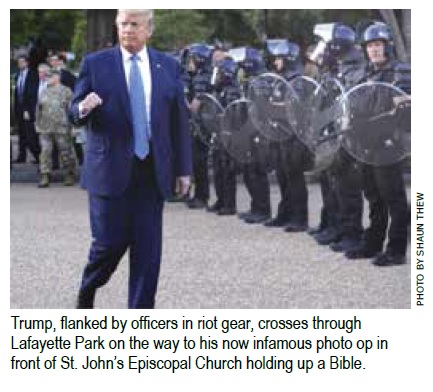
By Zoe Dunning–
My iPhone screen lit up—incoming group video call from Lissa and Yvette. I was sitting in my backyard, trying to catch a little sun before my next Zoom work call. It was a little after 3 pm here, which meant 11 pm in Scotland, where Yvette lives. Something big must be up, so I answered.
“What are you doing?? Turn on CNN right now!” they ordered.
These are two of my dearest friends, both U.S. Army veterans. Lissa served as a Chinook helicopter pilot, was kicked out of the Army under Don’t Ask, Don’t Tell, and is now an Assistant Professor of Leadership at West Point. Yvette is a retired Colonel who at one point was responsible for leading all military intelligence operations for U.S. Special Forces in Africa. Both have commanded troops for much of their Army careers.
I did as instructed, and tuned into the livestream coverage waiting for President Trump’s remarks in the Rose Garden. The three of us watched live as peaceful demonstrators outside the White House were charged by riot police, pushed back, and gassed.
“GD they’re using flashbangs!!!” Yvette exclaimed.
Stun grenades exploded across our screens as disoriented protestors spun in multiple directions trying to figure out how to escape the line of uniformed officers coming at them.
“What are they DOING?” “Why are they doing that?” we repeatedly shouted at each other, hoping one of the three of us could make sense of what we were seeing.
Then the President took the podium for his brief remarks. These words shook me to my core:
“Today I have strongly recommended to every governor to deploy the National Guard in sufficient numbers that we dominate the streets. Mayors and governors must establish an overwhelming presence until the violence is quelled. If a city or state refuses … then I will deploy the United States military and quickly solve the problem for them.”

“He’s declaring martial law?!” I asked.
“Just about. He didn’t say the words, but pretty damn close,” Lissa responded.
We sat there stunned, processing what we had just seen and heard. Then the President and his entourage strode over to the church for the now infamous photo op holding the (upside down) Bible. With him were the military’s two leaders, Secretary of Defense Mark Esper and Chairman of the Joint Chiefs of Staff General Mark Milley, wearing his camouflage Army Combat Uniform, perhaps to emphasize that they were going into battle. Against Americans in America’s cities.
“I know a lot of folks that will refuse to go,” Yvette commented. “No way.”
What my friend so quickly recognized is the conflict that many in the military experience when they are asked to perform a duty that they know to be morally incongruent with their beliefs or what they know to be the role of the military. LGBTQ-friendly military attorneys assigned to prosecute Don’t Ask, Don’t Tell cases faced this dilemma for many years until repeal. Military recruiters who have to reject applications from fully qualified transgender candidates face it.
As a U.S. Navy veteran, I know I signed up to protect and defend our country against all enemies “foreign and domestic.” But what constitutes a domestic enemy? Yes, there was some violence and property damage done in conjunction with the recent protests, but almost never by the protestors themselves. How can we force our military to, using the President’s words, “dominate the streets” and “establish an overwhelming presence” against unarmed protestors? That is not what we signed up for.
Fortunately, resistance to deploying the military domestically came swiftly from prominent military and diplomatic leaders. On June 5, more than 280 retired diplomats, generals, and senior national security officials signed onto a statement titled “The Strength of America’s Apolitical Military.” In it they called on President Trump not to use the U.S. military for political ends, warning that American democracy was at risk. “There is no role for the U.S. military in dealing with American citizens exercising their constitutional right to free speech, however uncomfortable that speech may be for some,” the statement said.
Additionally, several individual high-profile military leaders have publicly denounced the move. Former Joint Chiefs of Staff Chairman Ret. Gen. Martin Dempsey condemned Trump’s threat to use military force to suppress nationwide protests as “dangerous” and “very troubling.” Retired Marine Gen. Jim Mattis, Trump’s former defense secretary, also criticized Trump over his call for active-duty troops. Gen. John Allen, the former commander of American forces in Afghanistan, stated, “It wasn’t enough that peaceful protesters had just been deprived of their first-amendment rights—this photo-op sought to legitimize that abuse with a layer of religion.”
Former Chairman of the Joint Chiefs of Staff Admiral Mike Mullen, the man most responsible for the Pentagon’s change of heart in the Repeal of Don’t Ask, Don’t Tell, weighed in with this: “Whatever Trump’s goal in conducting his visit, he laid bare his disdain for the rights of peaceful protest in this country, gave succor to the leaders of other countries who take comfort in our domestic strife, and risked further politicizing the men and women of our armed forces.”
I’m grateful saner minds prevailed, and all active duty troops deployed domestically to supplement law enforcement have since been ordered back home. Our military should never be put into a position to take up arms against peaceful citizens. It was a terrifying week where our President continued to stoke fear and division, but we must never let him use the United States military as a politicized tool. And we should never put our men and women in uniform in a position of having to follow orders that they know will bring harm to Americans.
Zoe Dunning is a retired Navy Commander and was a lead activist in the repeal of Don’t Ask, Don’t Tell. She serves on the California Veterans Board and is a Transformation Coach at Future State ( https://futurestate.com/ ). She formerly served as Co-Chair of the Board of Directors for the Alice B. Toklas LGBT Democratic Club and is the former First Vice Chair of the San Francisco Democratic Party.
Published on June 11, 2020
Recent Comments